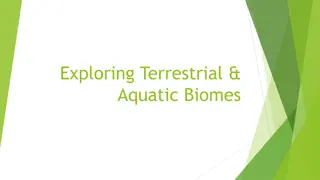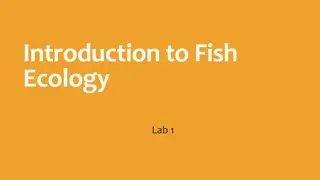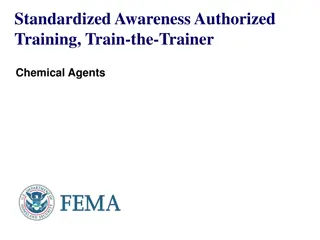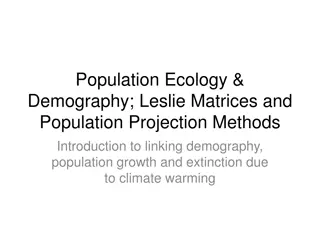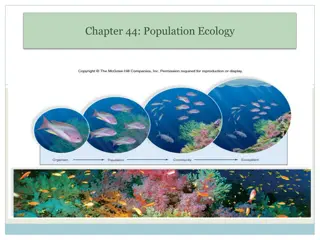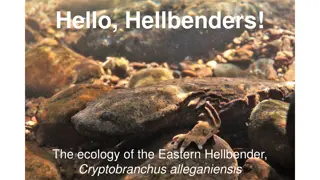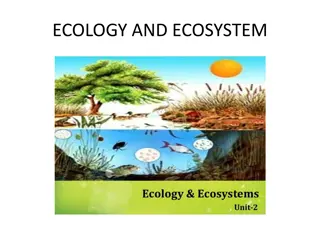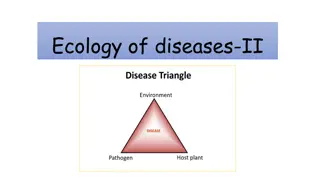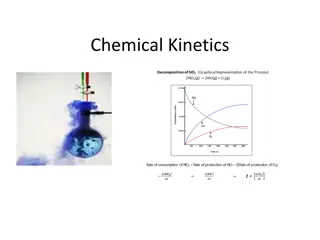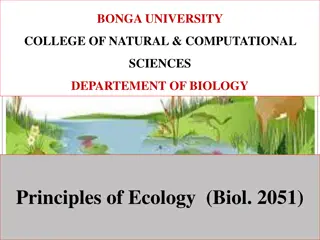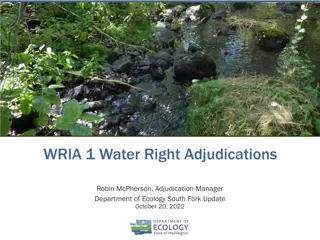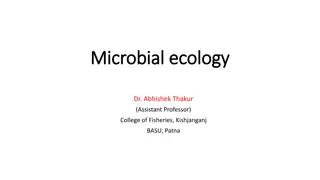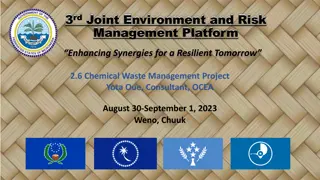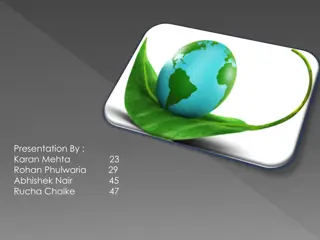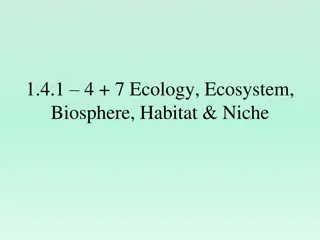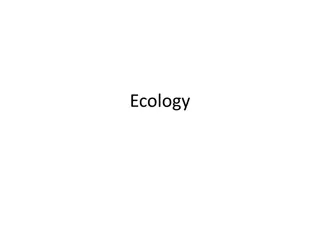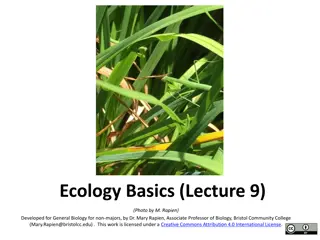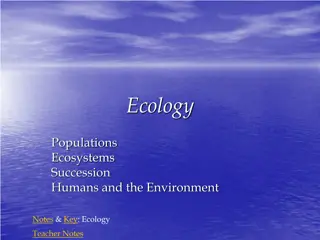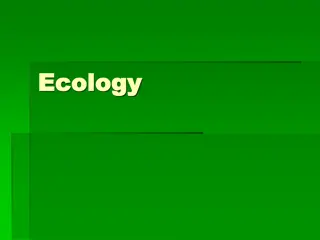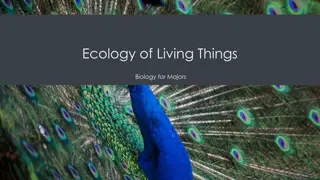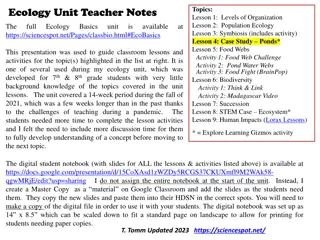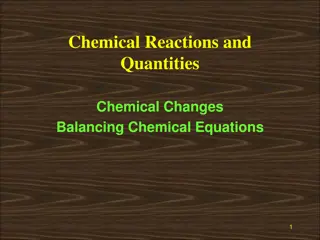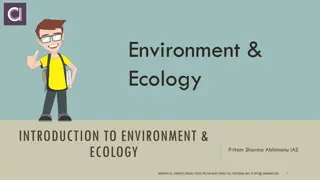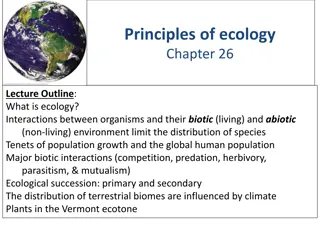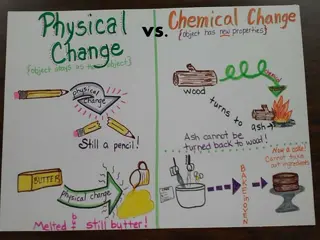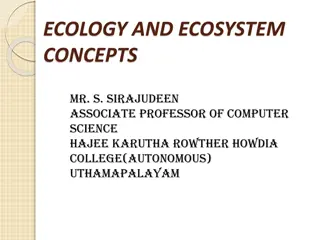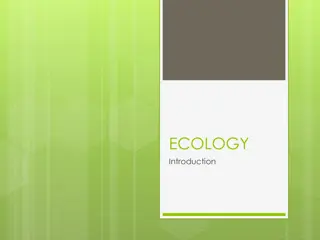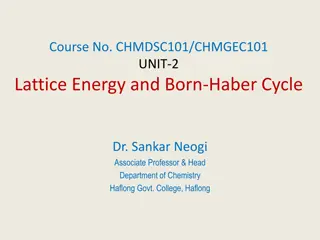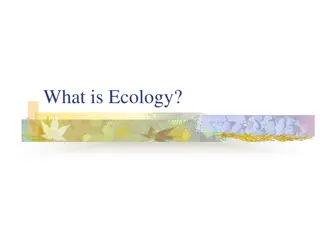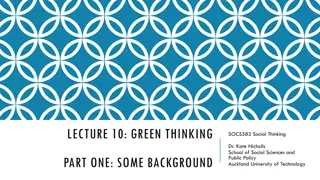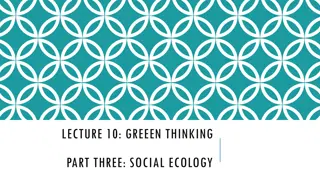Understanding Ecology: Interactions Between Organisms and their Environment
Ecology is the scientific study of how living organisms interact with each other and their environment. It delves into the relationships between biotic and abiotic factors, encompassing topics such as the distribution and abundance of organisms, structural adaptations, behavior under natural conditi
2 views • 42 slides
Understanding Ecosystems: Ecological Interactions and Dependencies
Ecology is the study of how organisms interact with their environment, influencing their distribution and abundance. This exploration covers terrestrial and aquatic biomes, energy flow, environmental impacts, adaptations, and global ecosystems, emphasizing the interconnectedness of all living organi
2 views • 58 slides
Understanding Fish Ecology: Interactions, Diversity, and Environmental Factors
Fish ecology involves studying the distribution, interactions, and abundance of fish species in different ecosystems. This lab delves into the divisions of ecology, fish species diversity in marine and freshwater ecosystems, and the environmental factors affecting fish diversity and abundance. Disco
1 views • 7 slides
Chemical Agents Awareness Training Overview
This training module covers standardized awareness and authorized training on chemical agents, including toxic industrial chemicals, riot control agents, and chemical warfare agents. Participants will learn about the physiological signs/symptoms, advantages/disadvantages of using chemical agents for
1 views • 20 slides
Enhancing Chemical Formula Writing Skills for Students
This action research focuses on improving students' ability to write and name chemical formulas. The study addresses challenges in understanding and applying chemical concepts in a general chemistry course. Strategies include utilizing worksheets, group collaboration, and mobile applications to enha
0 views • 13 slides
Understanding Population Ecology and Demography Through Leslie Matrices
Explore the critical aspects of population ecology and demography, focusing on factors influencing abundance, population growth, regulation, and the impacts of climate change. Learn about population projections, growth models, age-structured populations, and data requirements for estimating populati
4 views • 35 slides
Understanding Population Ecology and Growth Patterns
Explore the intricacies of population ecology, demography, distribution patterns, and growth rates in natural populations. Learn about limiting factors, resources, biotic potential, and the concept of carrying capacity. Gain insights into population dynamics and the interplay between organisms and t
1 views • 19 slides
Understanding the Ecology of Eastern Hellbenders
This comprehensive guide explores the ecology of Eastern Hellbenders (Cryptobranchus alleganiensis), discussing the abiotic and biotic factors influencing these fascinating salamanders. Covering topics such as populations, communities, and the essential role of producers, it sheds light on the chall
2 views • 16 slides
Understanding Ecology and Ecosystem: A Comprehensive Overview
Ecology, derived from the Greek word "oikologie," explores the interactions between organisms and their environment. The study encompasses various branches like human ecology, population ecology, and habitat ecology, focusing on the relationships within ecosystems. An ecosystem, defined by A.G. Tans
1 views • 68 slides
Understanding Ecosystems and Disease Ecology
Explore the diverse types of ecosystems, including autochthonous, anthropurgic, and synanthropic ecosystems, and their impact on disease ecology. Learn about biotopes, biocenosis, ecological mosaics, and ecological interfaces, and discover how infectious diseases can be transmitted across these inte
0 views • 10 slides
Understanding Chemical Kinetics: Rates of Reactions and Factors Influencing Them
Chemical kinetics delves into the speed of chemical reactions and the factors that influence reaction rates. This field explores how collisions between atoms, ions, or molecules drive chemical reactions, as well as the role of catalysts, reactant concentration, temperature, and surface area. By unde
0 views • 32 slides
Understanding Media Ecology: Impact of Communication Technology
Media ecology is a theoretical concept analyzing the influence of media and communication technology on human culture. Neil Postman, a prominent figure in the field, delves into how communication media affect human perception, understanding, and values. This study views media as environments shaping
4 views • 23 slides
Principles of Ecology: Understanding Organism-Environment Interactions
Ecology is the scientific study of how living organisms interact with each other and their environment. It involves understanding organisms at their native habitats, from individuals to ecosystems. The discipline encompasses various branches and focuses on the relationships shaping the distribution
1 views • 14 slides
Understanding Water Right Adjudications in Washington State
Water right adjudications in Washington State, managed by Robin McPherson of the Department of Ecology, aim to regulate water ownership through legal processes. The adjudication recognizes various water users' rights, including federal and tribal, and involves a thorough review of claims by Ecology
1 views • 12 slides
Understanding Microbial Ecology: Interactions and Associations in Ecosystems
Interactions of organisms in ecosystems play a crucial role in the functioning of microbial ecology. Dr. Abhishek Thakur explores symbiosis, mutualism, syntrophism, commensalism, predation, and parasitism, shedding light on how different organisms interact with each other and their physical environm
0 views • 9 slides
Enhancing Synergies for Resilient Tomorrow: Chemical Waste Management Project Overview
Enhancing Synergies for a Resilient Tomorrow outlines a project aimed at strengthening the Federated States of Micronesia's capacity in chemical management. The project focuses on monitoring and evaluating chemical use, enhancing legislative frameworks, and establishing a central database for chemic
0 views • 12 slides
Understanding the Relationship Between Ecology and Business
Ecology and business have a complex relationship where human activities impact the ecological environment, and in turn, the environment influences our quality of life. Maintaining ecological balance is crucial for sustainable development, and businesses play a significant role in ensuring environmen
0 views • 19 slides
Understanding Ecology and Ecosystems
Discover the definitions and concepts of ecology, ecosystems, biosphere, habitats, and niches. Learn how living organisms interact with each other and their environment, explore different types of ecosystems, and understand the global ecosystem known as the biosphere.
0 views • 20 slides
Understanding Ecology and Basic Concepts in Environmental Science
Explore the fundamental concepts of ecology and environmental science, including species, habitat, population, community, autotrophs, heterotrophs, environment components, food chains, and trophic levels. Learn about the intricate relationships between living organisms and their surroundings in this
0 views • 35 slides
Understanding Ecology: Ecosystems, Biodiversity, and Energy Flow
Explore the intricate world of ecology through topics such as ecosystems, biodiversity, energy flow, and nutrient cycling. Delve into the concept of niches, biodiversity levels, and the importance of energy flow and materials cycling in sustaining ecosystems. Learn about the nitrogen and carbon cycl
1 views • 18 slides
Understanding Ecology: Populations, Ecosystems, and Relationships
Explore key concepts in ecology including populations, population size and density, dispersion patterns, population growth, habitat and niche relationships, symbiosis, ecosystem energy flow, and roles of producers, consumers, and decomposers.
1 views • 27 slides
Understanding Ecology: Interactions in Ecosystems
Explore the intricate web of interactions in ecosystems through the study of ecology. Learn how biotic and abiotic factors shape ecosystems, trace energy flow, and understand nutrient cycles. Discover the importance of biodiversity and the impact of human activities on the biosphere. Dive into topic
0 views • 51 slides
Understanding Ecology: Interactions in Nature
Ecology entails the study of interactions among organisms and their environment, from the biosphere to ecosystems, populations, communities, and habitats. It includes concepts like competition and limiting factors that impact species survival and population dynamics.
0 views • 30 slides
Exploring Community Ecology: Interactions in Ecosystems
Community ecology, as presented by Mr. Nitin A. Ghorpade, delves into the dynamics of species interactions within ecosystems. It covers concepts like communities, individualistic vs. interactive hypotheses, interspecific interactions, predation, parasitism, plant defenses against herbivores, and mor
0 views • 23 slides
Understanding Ecology: Interactions and Environments in Biology
Ecology is the study of interactions between living organisms and their environment. It involves levels of research such as animal ecology, plant ecology, and more, while also exploring the biosphere's impact, biogeography, species distribution patterns, and energy sources like sunlight. Ocean upwel
1 views • 80 slides
Overview of Chemical Reactor Design and Operation
Chemical reactor design involves studying the rates and mechanisms of chemical reactions, as well as the design of reactors for these reactions on a commercial scale. This field combines principles from thermodynamics, chemical kinetics, fluid mechanics, mass transfer, heat transfer, and economics t
0 views • 12 slides
Comprehensive Ecology Unit for Middle School Students
Engage 7th & 8th grade students in a 14-week ecology unit covering topics like levels of organization, population ecology, symbiosis, biodiversity, human impacts, and more. Utilize digital notebooks, interactive activities, and exploration tools to enhance learning and understanding. Access resource
0 views • 18 slides
Understanding Chemical Changes and Reactions
Explore the concepts of chemical and physical changes, including balancing chemical equations, physical properties, and examples of chemical reactions. Learn to distinguish between physical and chemical changes through visual aids and learning checks.
0 views • 24 slides
Introduction to Ecology and Environment Studies
Ecology is the study of the relationship between organisms and their environment, while the environment refers to the surroundings that influence living organisms. The biosphere is divided into the atmosphere, lithosphere, and hydrosphere. Terms in ecology include species, populations, communities,
0 views • 13 slides
Exploring Ecology: Interactions, Distribution, and Population Dynamics
Ecology delves into the relationships between organisms and their environment, understanding factors that limit species distribution, major interactions like competition and predation, as well as population growth patterns. This includes the influence of biotic and abiotic factors, ecological succes
0 views • 30 slides
Understanding Ecology: Key Concepts and Types Explained
Ecology, a vital branch of science, delves into the relationships between organisms and their environment. It encompasses biotic and abiotic factors, studying how living and non-living elements interact within ecosystems. Biotic components include living organisms like plants and animals, while abio
0 views • 7 slides
Understanding Physical and Chemical Changes in Science Class
Explore the concepts of physical changes and chemical reactions in this interactive science lesson. Students will differentiate between the two types of changes, identify evidence for each, categorize examples, and discuss key concepts with their peers at the table. Through videos and discussions, t
0 views • 21 slides
ASU EHS & FSE Chemical Approval Process Guidelines
Detailed guidelines and forms for the chemical approval process at ASU, including links to important resources, forms for new chemical purchases and transfers, responsibilities for lab managers, and procedures for chemical transfers. The process involves completing forms such as the Prior Approval A
0 views • 5 slides
Understanding Chemical Reactions in Daily Life
Understanding chemistry, particularly chemical reactions, is crucial for our daily lives. Chemical reactions involve the transformation of substances into different ones, described by reactants and products in equations. By learning about chemical equations, word equations, formula equations, and th
0 views • 15 slides
Ecology and Ecosystem Concepts: Understanding Interrelationships in Nature
Ecology explores the interconnections between living organisms and their environment, dating back to zoologist Geoffroy St. Hilaire's early proposal in 1859. The term "ecology" originates from the Greek words for house and discourse, emphasizing the study of organisms within their habitat. Ecosystem
0 views • 36 slides
Exploring Ecology: Interactions and Environments
Dive into the world of ecology, where organisms interact and rely on each other and their surroundings. Understand the concepts of populations, communities, ecosystems, biomes, and the biosphere. Explore the vocabulary of ecology, from individual organisms to entire biomes. Learn about food chains,
0 views • 14 slides
Understanding Ionic Bonding and Lattice Energy in Chemistry
Chemical bonds play a crucial role in holding atoms together in molecules. This course explores the concept of chemical bonding, focusing on ionic bonds and lattice energy. Topics covered include the different types of chemical bonds, such as electrovalent and coordinate bonds, as well as the models
0 views • 22 slides
Understanding Ecology: Interactions in the Environment
Ecology, originating from the Greek words "Oikos" and "Logos," is the study of interactions between living and non-living components in the environment. It encompasses the relationships between plants, animals, microorganisms, and abiotic factors like light, water, nutrients, and atmosphere. Studyin
0 views • 16 slides
Exploring Green Thinking: Societal Perspectives on Environment and Ecology
Delve into the realm of green thinking through the eyes of social sciences in this lecture by Dr. Kate Nicholls at Auckland University of Technology. The discourse ranges from traditional Western views on nature to the rise of the green movement, including discussions on deep ecology, social ecology
0 views • 9 slides
Exploring Social Ecology and Anarchism: A Path to Sustainable Future
Social ecology emphasizes the interconnectedness between social issues and environmental problems, advocating for a society without domination or centralized control. Anarchism, often associated with social ecology, critiques hierarchy and promotes cooperation. The affinity between feminism and ecol
0 views • 8 slides

